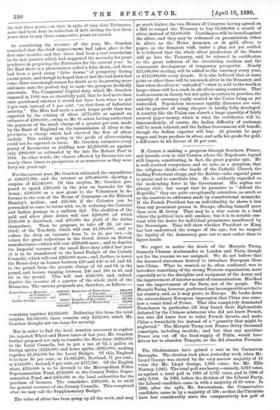For the current year, Mr. Goschen estimated the expenditure at
£86,857,000, and the revenue at £90,406,000, showing a surplus of £3,549,000. Of this surplus, Mr. Goschen pro- posed to spend £300,000 in the year on barracks for the Army; £100,000 on a new grant to the Volunteers in de- ference to the vote of the House of Commons on Sir Edward Hamley's motion ; and £80,000, if the Colonies can be persuaded to come to terms with us, in reducing the Colonial and Indian postage to a uniform 24d. The abolition of the gold and silver plate duties will cost £200,000 (of which £120,000 is drawback, and £80,000 the yield of the duties themselves). Then he proposes to take off 2d. (or one- third) of the Tea-duty, which will cost £1,500,000; and to reduce the duty on currants from 7s. to 2s. per cwt.,—in return for great reductions in the Greek duties on British manufactures,—which will cost £210,000 more ; and to deprive the Imperial revenue of the small Beer-duty added last year (it is to be transferred to the Local Budget of the County Councils), which will cost £386,000 more ; and, further, to lower the House-duty on houses between 220 and 240 to 2d. and 4d. in the pound, from the present charge of 6d. and 9d. in the pound, and houses ranging between £40 and £60 to 4d. and 6d. in the pound. This will cost £540,000, and, indeed, deprive the revenue of a quarter of the whole yield of the House-tax. The various proposals are, therefore, as follows :—
Erpenditare on Barracks
£800,000 Remission of Plate-duties £200,000 7 on Volunteers on Colonial ... and 100,000 ,,of Tea-duty „ of Currant-duty 1,500,000 21.0,000 Indian Postage
80,000 Transfer of Beer-duty Remission of House-duty 386,000 540,000
2480.000
£2,838,000
—making together 23,316,000. Deducting this from the total surplus, £3,540,000, there remains only £233,000, which Mr. Goschen thought not too large for security.


















































 Previous page
Previous page